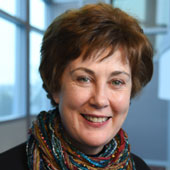Brenda Finucane is associate director of the Autism and Developmental Medicine Institute at Geisinger in Lewisburg, Pennsylvania.

Brenda Finucane
Associate director
Autism and Developmental Medicine Institute at Geisinger
From this contributor
Q&A with Brenda Finucane: Building pipelines for genetic tests for autism
Most autistic people do not receive the medically recommended genetic tests for autism. Brenda Finucane and her colleagues want to change that.

Q&A with Brenda Finucane: Building pipelines for genetic tests for autism
Explore more from The Transmitter
Neuro’s ark: Spying on the secret sensory world of ticks
Carola Städele, a self-proclaimed “tick magnet,” studies the arachnids’ sensory neurobiology—in other words, how these tiny parasites zero in on their next meal.

Neuro’s ark: Spying on the secret sensory world of ticks
Carola Städele, a self-proclaimed “tick magnet,” studies the arachnids’ sensory neurobiology—in other words, how these tiny parasites zero in on their next meal.
Autism in old age, and more
Here is a roundup of autism-related news and research spotted around the web for the week of 2 March.

Autism in old age, and more
Here is a roundup of autism-related news and research spotted around the web for the week of 2 March.
Lack of reviewers threatens robustness of neuroscience literature
Simple math suggests that small groups of scientists can significantly bias peer review.

Lack of reviewers threatens robustness of neuroscience literature
Simple math suggests that small groups of scientists can significantly bias peer review.